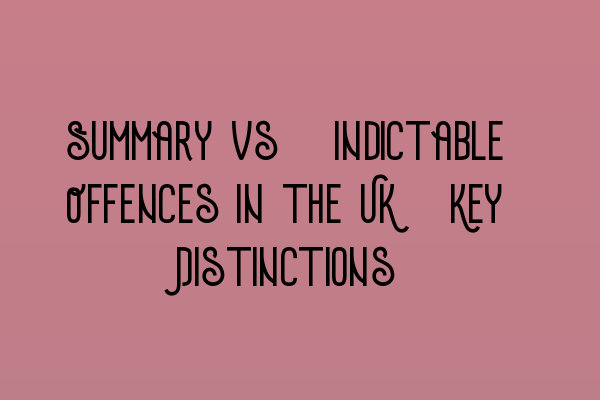Summary vs. Indictable Offences in the UK: Key Distinctions
Welcome to the SQE Criminal Law & Practice Law UK blog! In this article, we will discuss the key distinctions between summary offences and indictable offences in the UK legal system. So, whether you are studying for the SQE exams or simply seeking a deeper understanding of criminal law, this post is for you!
What Are Summary Offences?
Summary offences, also known as minor offences, are less serious criminal offenses that are typically heard in the Magistrates’ Court. These offenses include petty theft, public disorder, and certain driving offenses. Summary offences are usually punishable by fines, community service, or short custodial sentences.
If you are preparing for the SQE 1 exams, it’s important to familiarize yourself with the types of summary offences and their elements. Practicing SQE 1 exam questions related to summary offenses can help you solidify your knowledge and improve your exam performance. Check out the SQE 1 Practice Exam Questions article for valuable practice resources.
What Are Indictable Offences?
Indictable offences, on the other hand, are much more serious crimes that are heard in the Crown Court. These offenses include murder, rape, robbery, and other grave offenses that carry significant penalties. Indictable offences are often complex and require a thorough investigation and legal expertise.
If you are studying for the SQE 2 exams, it’s crucial to understand the key aspects of indictable offences and their procedural implications. SQE 2 preparation courses can provide you with comprehensive knowledge and exam strategies. Take a look at our SQE 2 Preparation Courses article to explore your options.
Key Distinctions between Summary and Indictable Offences
While summary offences are less serious than indictable offences, there are several key distinctions between the two:
- Penalties: Summary offences are generally punishable by fines, community service, or short custodial sentences, whereas indictable offences carry more severe penalties, such as long prison terms.
- Trial Process: Summary offences are usually heard and decided by a magistrate in the Magistrates’ Court, while indictable offences are tried by a judge and jury in the Crown Court.
- Sentencing Powers: Magistrates have limited sentencing powers for summary offences, while Crown Court judges have wider discretion when sentencing individuals convicted of indictable offences.
- Right to Trial: In cases of indictable offences, defendants have the right to choose whether to be tried by a judge and jury or opt for a judge-alone trial. This election is not available for summary offences.
To ensure success in the SQE exams, it’s crucial to understand these distinctions and their implications in criminal law. Practicing SQE 1 mock exams, such as FLK1 and FLK2, can help deepen your understanding of summary and indictable offences. Check out our SQE 1 Practice Mocks FLK1 FLK2 article for valuable resources to enhance your preparation.
Conclusion
Understanding the differences between summary and indictable offences is essential for any aspiring criminal lawyer. Whether you’re preparing for SQE exams or simply interested in the UK legal system, grasping the key distinctions will contribute to your success. For more information about SQE exam dates and comprehensive preparation courses, visit our SRA SQE Exam Dates and SQE 1 Preparation Courses articles. Remember to stay focused, practice diligently, and good luck on your legal journey!
